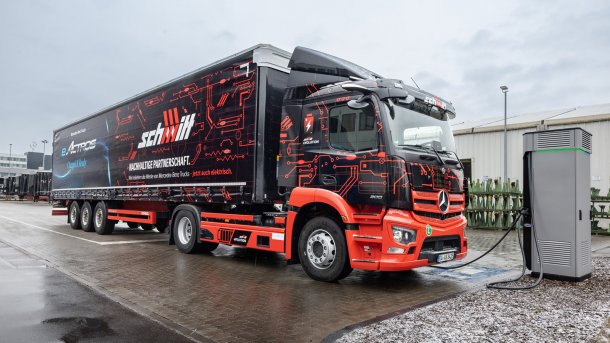Drive turnaround: Cost of electric drives for trucks falls faster than expected
Thanks to falling costs, electrically powered trucks can soon be on the roads in large numbers, a Fraunhofer study shows. The appeal: build infrastructure!

(Image: Daimler Truck)
The Fraunhofer Institute for Systems and Innovation Research in Karlsruhe has determined how quickly electrically powered trucks could benefit from the falling costs of batteries and fuel cells. According to the study published today, the resulting rapid increase in market share should help support national and international climate targets.
According to the study, battery-electric trucks are the most mature and therefore the most cost-effective solution for most applications. The study therefore recommends that industry and politicians create production capacities for the vehicles and a nationwide charging infrastructure soon.
Analysis of the key components
To get a picture of the situation, Fraunhofer analyzed a study from "Nature Energy" on the cost development of the main components of zero-emission trucks, batteries and fuel cells, and included relevant figures from other publications, including older ones. The cost development derived from this was then compared with the expected costs for the technological breakthrough. In addition, the total cost of ownership (TCO) was used to compare the costs of electrically powered trucks with those of conventional trucks for the years 2020, 2030 and 2040.
Costs are falling faster than expected
The results show that the costs of battery and fuel cell systems for heavy-duty trucks will fall significantly faster than expected in older studies. According to the study, battery systems will soon cost less than 200 EUR/kWh and are likely to cost 100 EUR/kWh in the late 2040s. Fuel cells could only cost around 150 EUR/kW in the late 2030s, although the researchers speak of greater uncertainty in this area due to the still less advanced stage of development.
Battery electric trucks, on the other hand, are very likely to be able to undercut the cost level of today's trucks with diesel engines for the foreseeable future. While fuel cell trucks will still have to deal with hydrogen shortages and high drive prices for a long time to come, battery electric trucks, which are already cheaper, will benefit from low-cost mass production of storage systems and components thanks to the emergence of battery electric mobility in passenger cars across a broad front.
Videos by heise
The technology is already so suitable for everyday use that it can now also provide the required ranges and payloads for most logistics applications in trucks. Despite the wide lead of battery-electric trucks, public funding for the research and development of fuel cell trucks continues to make sense. The study sees regions that are difficult to electrify or special transportation as a market niche for fuel cell trucks, at least as soon as hydrogen is available in sufficient quantities.
Promoting production and charging infrastructure
The recommendations to politicians: The necessary reduction of greenhouse gas emissions in road freight transport requires a rapid transition to zero-emission trucks. It requires support for mass production for a rapid market ramp-up and immediate investment in electricity grids and charging infrastructure to avoid delays. "Prioritizing the promotion of battery electric trucks is a policy no-regret option that reduces uncertainty, makes better use of limited public budgets and sets the direction for the logistics market."
(fpi)